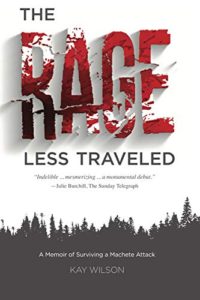Kay Wilson has written an extraordinary book about terror; The Rage Less Traveled, based on personal experience.

The first sentence in the book grabs you as she takes you to the Israeli hospital where she is being questioned about the machete attack against her and her friend Kristine Luken. This will not spoil the plot. Kristine died from her wounds.
Kay has an unusual way of telling a story. She managed to connect the book,The Wizard of Oz, with her terror attack. Each chapter begins with a quote from the Wizard. The juxtaposition is shattering. As was the ordeal. Kay was living between worlds for a very long time.
Chapter one begins with “I’m a little muddled.”
Kay had shared a tidbit about the theme song, “Somewhere Over the Rainbow” with Kristine when they began their hike that fateful Sabbath day. She had told Kristine that two sons of cantors had written the iconic song on the eve of World War II. Kristine hums the song. It was such a lovely day. Full of hope.
While she narrates the horror of the attack, she also shares fascinating information about Israel. After all, she is a tour guide. While telling the police about the attack, she shared the history of the places where she and Kristine were sitting; just before. It’s so strange how she intertwines the good with the evil. Confusing them; conflating them. The good is now firmly etched with the evil. And must be undone.
Kay tells her story through remarkable similes and metaphors. Giving each event, each action, more meaning. But there were times when I thought, enough Kay; enough with your similes and metaphors, over and over again, about the event. If I read one more…
And then I realized that her writing style drags us, perhaps unwillingly, into her life, the never ending memory of rage from a never, ever to be forgotten terror attack. We are kept inside her head, feeling her emotions, living her fears throughout the book. She never lets go. We first experience those moments in a forest when two Muslim Arabs, having decided that killing Jews was a great idea, attacked two women with machetes, thinking they were both Jewish. Her friend was Christian.
Friendship with Kay is an extraordinary relationship because she makes friends easily, quickly and holds on to us even when we are far away. For Kay, Kristine was a friend, as if they had been friends, forever.
Kay lived through her attack and played dead while the terrorists completed the murder of her friend. I am not going to give a summary of the events. I could not do her words justice. Kay’s book, the sharing of her story, her inward journey to sanity, led me to think again about survivor’s guilt; the damage that it inflicts.
Kay, like so many people who have lived through trauma and the leftover PTSD, suffer from reliving the event and if others died while they lived, they may fall into the abyss of survivor’s guilt. “Why me? Why did I live? Why didn’t I do more for the others?”
I hurt for Kay as I read about that guilt. I felt her anguish; from the attack, and her guilt. She was stabbed thirty times, hands tied behind her back, her mouth taped shut, and yet managed to get up and walk through the park and find people to help her. There is a reason some survive horror; like a friend being murdered in front of your eyes. If Kay had not lived, her friend may never have been found, leaving her parents forever wondering what had happened to their daughter. And the men would have lived to kill again. And they had killed, again, when they came across Kristine and Kay. Evidence provided by Kay helped convict these two creatures of two murders, relieving the pain of another family-the family of Neta Blatt-Sorek.
I think we need to rename survivor’s guilt. It is a dangerous misnomer. As I read the book, I keenly felt Kay’s self-hate, and wanted to scream to her, “God was and is with you.” He kept her alive, helped her up, stood with her as she walked for assistance because God knows that we need survivors to bear witness to horror. People like Kay are the righteous amongst us. They bear witness to horror. Without witnesses it is as if it never happened. Bearing witness is the reason they live. We must not let people, like Kay, live with guilt, for they have been called to greatness. To bear witness.
Kay not only witnessed the horror, she turned the horror into an attack on foreign aid to murderers. She transformed the horror into goodness. She speaks about the money sent to the Palestinian Authority by countries around the world to aid them in nation building. But that money goes to Muslims who murder Jews. There is a reward for killing Jews; $3410.00 per month for life. And that reward keeps their families living very well, forever.
Kay has spoken at the United Nations. She reaches out to the media. She has been rebuffed by far too many, yet she has not stopped calling for an end to the bounty on the Jews.
There is a purpose for everything under heaven.
From the Ethics of the Fathers: “Rabbi Tarfon used to say, it is not incumbent upon you to complete the task, but you are not exempt from undertaking it.”


